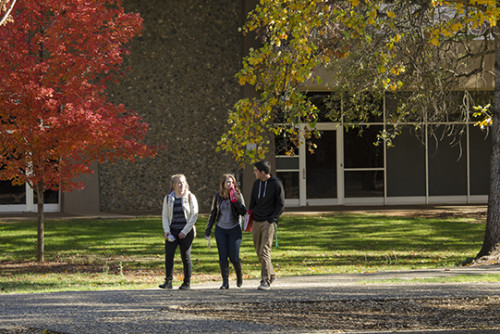University Studies: Humanities AA Degree
University Studies – 18 Unit Emphasis | SC Program: AA.1513
These courses emphasize the study of cultural, literary, humanistic activities and artistic expression of human beings. With careful planning, the Humanities emphasis will satisfy the lower division major courses to transfer to a university and earn a Bachelor’s degree in the various fields of Humanities.



Choose your path
Map your education by viewing the program map for the degree or certificate you’re interested in earning below. Meet with a counselor to create your official comprehensive education plan.
A program map shows all the required and recommended courses you need to graduate and a suggested order in which you should take them. The suggested sequence of courses is based on enrollment and includes all major and general education courses required for the degree.
Fall Semester, First Year
15 Units TotalThis course develops the reading, critical thinking, and writing skills necessary for academic success, emphasizing expository and argumentative writing as well as research and documentation skills. As a transferable course, it presupposes that students already have a substantial grasp of grammar, syntax, and organization, and that their writing is reasonably free from errors. A research paper is required for successful completion of the course. This course may be offered in a distance education format.
Spring Semester, First Year
15 Units TotalThis course is a comparative survey of the major ancient world civilizations which developed between 3500 B.C.E. and 1500 C.E. It examines political institutions, religious ideologies, the rise and fall of empires, and the major cultural innovations of each of the major world civilizations. This course may be offered in a distance education format.
This course is an introduction to the conservation or wise use of natural resources and incorporates discussions about the complex relationships of man to the environment. Students will learn about the diverse agencies that manage our resources along with their history and philosophies. The course will cover each of the major natural resources - such as water, air, energy, forests, wildlife, agriculture, and soils - as well as environmental policy and laws that govern the use of these resources. An emphasis is placed on the practical components of Environmental Science as it relates to social and economic aspects of conservation. This course may be offered in a distance education format.
This course is a survey of the history of the United States from Pre-Columbian Peoples to the end of Reconstruction. Topics include contact and settlement of America, the movement toward independence, the formation of a new nation and Constitution, westward expansion and manifest destiny, the causes and consequences of the Civil War, and Reconstruction. This course satisfies the CSU requirement for US History (US-1). This course may be offered in a distance education format.
Fall Semester, Second Year
16 Units TotalThis course critically examines the concept of morality as well as a number of representative ethical theories, such as Kantianism, Utilitarianism, Contractarianism, Divine Command Theory, and Virtue Ethics. It also introduces students to a range of moral and social problems such as abortion, euthanasia, capital punishment, cloning, warfare, gender and sexuality issues, political and economic issues, and the moral status of the natural world. This course may be offered in a distance education format.
This is a survey course designed for non-science majors. It spans the Earth-related sciences, including geology, oceanography, meteorology, and astronomy. In general, the course focuses on physical processes and materials as related to each discipline. Topics include the geologic evolution of the Earth, economic resources derived from the Earth, Earth materials, evolution and character of the oceans, ocean-atmosphere interactions, atmospheric processes including weather and climate, the solar system and Earth as part of the universe. Using an Earth systems approach, lecture and laboratory will consider concepts centered on the sustainable use of natural resources. The laboratory portion of this course provides hands-on activities that support and demonstrate lecture concepts. This course may be offered in a distance education format.
This course is an introduction to United States and California government and politics, including their constitutions, political institutions and processes, and political actors. An examination of political behavior, political issues, and public policy, this course satisfies the CSU requirement in U.S. Constitution and California State and local government (US-2 and US-3). This course may be offered in a distance education format.
Spring Semester, Second Year
14 Units TotalThis introductory course is designed to give the student thorough and intensive practice in speaking and listening to Spanish and reading and writing in Spanish, with special emphasis on grammar and pronunciation. The course will focus on communicative competence in situations relating to daily routines, home life, college life, and everyday activities such as meeting and describing people; finding out about schedules, directions, and locations; discussing weather, eating, and holidays. Students are introduced to the culture of Spanish-speaking people in general and to specific customs and cultural characteristics of various Spanish-speaking countries. This course may be offered in a distance education format.
This course takes an interdisciplinary approach to the study of race and ethnicity in the United States. It examines social justice movements in relation to ethnic and racial groups in the United States to provide a basis for a better understanding of the socioeconomic, cultural, and political conditions among key social groups including, but not limited to, Native Americans, African Americans, Asian Americans, and Latina/o Americans. This course examines the systemic nature of racial/ethnic oppression through an examination of key concepts including racialization and ethnocentrism, with a specific focus on the persistence of white supremacy. Using an anti-racist framework, the course will examine historical and contemporary social movements dedicated to the decolonization of social institutions, resistance, and social justice. This course may be offered in a distance education format.
Please see a counselor to discuss options for meeting general education requirements for transfer to California State Universities (CSU) and/or University of California (UC) campuses, as well as any specific additional courses that may be required by your chosen institution of transfer.
*Alternative Courses: Please see a Shasta College counselor for alternative course options. You can also view the following to find other courses to meet degree/certificate requirements:
- California State Universities – General Education
- IGETC – Intersegmental General Education Transfer Curriculum
Need a print out? Feel free to download and/or print out a copy of the sample program map(s).
Contact Us for More Information
Counseling & Student Services
Contact InfoAcademic/Instructional Division Office
Arts, Communications & Social Sciences (ACSS)
Contact InfoStart Your Future at Shasta College
We are dedicated to helping you reach your educational and career goals. To begin your journey, apply for admissions today!
